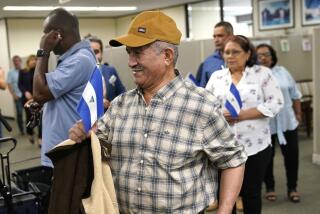Key Figure in Bay of Pigs Plan Says U.S. Risks Contras Disaster
- Share via
WASHINGTON — Twenty-five years after the disastrous Bay of Pigs invasion of Cuba, the deputy commander of the insurgent force warned Friday that the United States is risking a “Bay of Pigs in slow motion,” because of its faltering support for the anti-Sandinista rebels.
Erneido Andres Oliva, who survived capture and was ransomed for $500,000 in 1962, returned to the United States and rose to the rank of brigadier general in the U.S. National Guard. Unlike many of the others who served in the 1,400-man invasion force, Oliva says he is not bitter--”just frustrated”--at the failure of the United States to provide air cover for the landing.
Oliva said that use of U.S. troops would have been a mistake in Cuba and would be a mistake in Nicaragua. But, he said that advisers, along with logistical and air support are essential to insurgents fighting an established military force.
“From a military point of view, (the Nicaraguan rebels) have a heck of a chance to win,” Oliva said. He said he would tell Enrique Bermudez, military commander of the rebels of the Nicaraguan Democratic Force, known as contras , “that he has $100 million (in aid) and a year to do it.”
$100 Million in Aid
Reagan is seeking $100 million in military and non-lethal aid for the contras over the next 18 months. The Senate passed his proposal, but the House on Wednesday deferred action on the measure at least until next month.
Oliva told reporters that he had been abroad during the revolution that brought Fidel Castro to power in 1959. Oliva, a Cuban military officer, came home to become briefly an inspector general in the implementation of Castro’s land reform program. He soon left for Miami and then went to Guatemala to be trained as one of the “fighters of freedom.”
Oliva said he was initially scheduled to lead a guerrilla landing party of 50 men, but that CIA agents in charge of the training later changed the strategy to a conventional invasion.
“I liked that, as a regular army officer,” he said, although he conceded that many analysts have concluded that the original plan for a paramilitary operation was preferable. And while the choice of the Bay of Pigs on Cuba’s south coast as the landing site also has drawn criticism from military experts, he said it was one of the few coastal areas with swamps offering an assault force an opportunity to defend a beachhead easily--with air cover.
Opposed Night Landings
What he did disapprove of, he said, was landing at night, which he said even the U.S. Army had avoided during World War II because of the high risk.
As the invaders struggled ashore in their makeshift outboard launches, on the night of April 17, 1961, many of them capsized in the dark. Oliva, in command of a 450-man auxiliary force, encountered additional difficulties because the main guerrilla force had landed nearly 45 minutes earlier and alerted defenders.
As the expected air cover failed to materialize, the invading force was cut off from supply ships by Castro’s air force, leaving them without ammunition by April 19. Cuban troops killed 114 of the invaders and took about 1,200 prisoner. Oliva and some of his troops took to the hills and were the last to be captured two weeks later.
Certain that he was going to be executed, Oliva was visited in his prison cell by Castro, who told him that he would instead be held for ransom along with the other prisoners.
More to Read
Sign up for Essential California
The most important California stories and recommendations in your inbox every morning.
You may occasionally receive promotional content from the Los Angeles Times.













